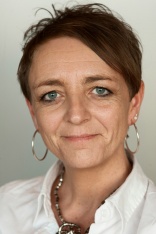Home › magazine › october 2019 › latest news › A workplace out of the ordinary
A workplace out of the ordinary
20th of November 2019Lotte Printz, ECJ’s correspondent in Denmark, reports from an inspiring business - The Laundry.
“It could be a cleaning company, a bicycle workshop or something else. The main thing is that each and every one can contribute and that we do things together,” Pia Stabell Hjort says.
She and Katrine Knudsen are social workers who worked in a residential care home for people with learning disabilities when they had the idea to start The Laundry. A “practice course for people with learning disabilities” as they call it – on their terms.
This workplace adapts to its employees, rather than the other way around.
“They have grown immensely. And on a day like this when people have called in sick, they have re-organised and shared the tasks between them all by themselves,” Katrine Knudsen says when I visit.
Some have learned taking the bus on their own to work and to see the private and professional customers where they collect and deliver laundries. And with a helping hand or a little encouragement they manage the other tasks of a laundry on their own.
Some of them think it’s still a bit difficult, but being a contributing part of a workplace is important to the extraordinary employees of The Laundry, as well as meeting and chatting with the customers. Having room for a cup of coffee and for chatting with Katrine, Pia and all the people from the local community who stop by are the most valued characteristics of a working day, its employees proclaim when gathered around a big, homely table while washing machines and tumble dryers are roaring in the back.
Raphael Bo Jensen can think of other gains as well: “I’ve learned a lot here. As a human being, too. Today, I’m not afraid of talking in front of a large audience. My self-esteem has been strengthened.”
If the two initiators are asked to give a talk, they decline: “We all go together, or we don’t go at all,” Pia Stabell Hjort stresses.
With a traditional business mindset, it’s not necessarily easy to understand how this workplace works. And the local municipality officials actually deemed The Laundry ‘not viable’ when Katrine Knudsen and Pia Stabell Hjort first presented the idea to them.
Three years on, local authorities, municipality officials and organisations from around Denmark are beginning to see the point and are curious to learn.
Katrine Knudsen and Pia Stabell Hjort believe there’s lots of inspiration for local authorities, but do not think The Laundry could have been initiated by local authorities themselves. They do not want municipality funding to run the place either, because then expectations will have to be met.
They are well aware, though, that one ‘yes’ was needed to get The Laundry started – and that came from a housing organisation who gave them access to a community laundry room in a housing estate.
Since then it’s not just the people working in The Laundry that have grown. From humble beginnings in the community laundry room, The Laundry moved to larger premises in a former grocer’s shop in the area in March. Coffee is served when The Laundry is open and people from the neighbourhood come and go. People who just like the atmosphere or would otherwise have felt lonely.
The Laundry does not consider itself a business, nor a social community. But it is certainly a workplace out of the ordinary and a good example of ‘civil disobedience’ as the local mayor recently called it.









